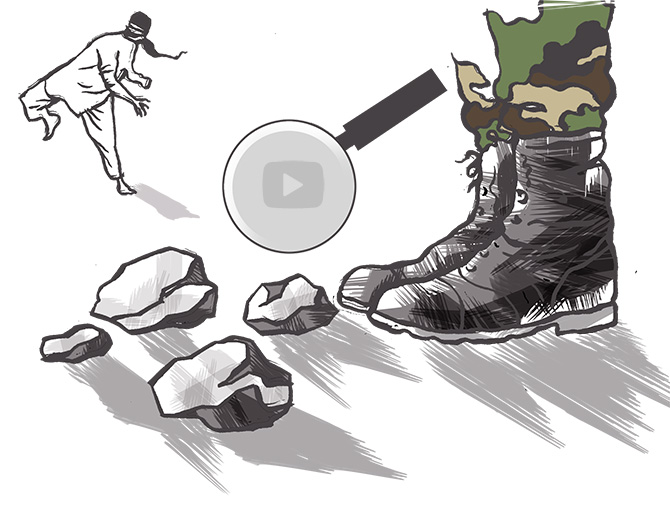'Those who feel the irresistible need to express strong sentiment for our nation and its contents must consider being pro-Indian, whether this Indian be jawan, cobbler, Kashmiri, lesbian, Dalit, protester, pujari, businessman or child,' says Aakar Patel.
Illustration: Dominic Xavier/Rediff.com

I am not pro-army. I'm not anti-army either.
I recognise that military power is an essential requirement of the nation State. It is irresponsible to raise militias in charge of national defence (I am not in favour of Vahinis and Senas), and so I suppose we must have an army. And then, while we are at it, a navy and an air force.
But other than this recognition of requirement, what does it mean to be pro-army?
In a recent interview, Vanita Kohli-Khandekar took Arnab Goswami to lunch and asked the great man about his ideology. He said: 'I am pro-India, pro-army, not a right-winger.'
None of these categories makes sense to me. These are puerile.
What does it mean to be pro-army in a nation not at war, and whose military and paramilitary force is deployed in formations against its own citizens in the north-east and in Kashmir and in the Adivasi belt?
Most of the people the Indian Army kills and maims every year are other Indians. So do those who say they are 'pro-Indian army' mean they are anti-Indian citizen?
And if that is the case, what does pro-India in the same sentence as pro-army mean?
It can only mean one thing: Support of the nation State and its sword-arm must come at the expense of its citizens. This is an obnoxious point of view and should be resisted.
What does right-winger mean?
Does it mean someone who wants a small government and is socially conservative (as it does in the United States)?
Someone who wants low tax rates, a ban on abortion and opposes equal rights for LGBTs?
A right-winger in the US sets great store by nationalism ('USA! USA!' is their version of BMKJ) and wants a big and muscular army with lots of expensive toys. That is the textbook definition of a right-winger.
And so to me the line 'I am pro-India, pro-army, not a right-winger' makes absolutely no sense.
Does a right-winger in India mean someone who hates Muslims?
But then, why not just call such an individual bigoted or intolerant because that is what they are?
Such a person has no consistent position on abortion or the size of government. Why sully the name of conservatism?
One wishes Mr Goswami had been pressed. I should hasten to say this is not about him or that interview. I am just using his statement to illustrate a larger point.
The formulation is repeated by the man investing most in Mr Goswami's television venture Republic TV -- the businessman Rajeev Chandrasekhar.
People applying for jobs at the channel (not Republic TV) were asked by Mr Chandrasekhar's office to show 'pro-India, pro-military' credentials, according to a Business Standard report in January.
Mr Chandrasekhar has business interests in defence and aerospace. Of course, he and his channel are going to be pro-military.
As a Gujarati, I can appreciate it -- it makes sense because business is business.
But why force this army worship on the rest of us?
The Indian Army's employees are protected against trial in our courts by the Armed Forces Special Powers Act.
Section 7 of the Act, which grants immunity, can be lifted in case the police find evidence of a crime and file a chargesheet after investigations.
In how many cases has the army allowed this to happen in Jammu and Kashmir since 1989? Zero.
A browbeaten civilian government, even if it wanted to, couldn't change this. But it is absolutely fine for Indian citizens to be murdered, kidnapped, raped, tortured and receive no justice.
Accepting that as all right is what being 'pro-army' really means. I refuse to be bullied into accepting this formulation.
Special interests and bigots are narrowing the categories in which Indians can express dissent, express love. Their categories will continue to be stuffed down the throat of those who do not offer resistance.
The Hindu middle class has produced a powerful consensus on nationalism. Those who do not shout slogans about the nation goddess and proclaim that they are pro-army are in some way indulging in treachery against India though they may well be going about their banal Indian lives and paying their taxes.
As I said, I am not pro-army any more than I am pro-postmen, pro-teachers, pro-nurses or pro-IAS officers. All of these also deliver essential and important and vital services.
Many Indians who do dangerous work for the State, such as our drainage workers, die at a rate higher than our soldiers but get no recognition or even justice.
Why limit our love of martyrs to one class of employees?
The father of a colleague of mine at work retired some time ago. The man had driven buses for the Brihanmumbai Electricity Supply and Transport Company.
What was his father's pension, I asked my colleague. A thousand rupees, he said.
Another colleague's father worked as a clerk in the Chhattisgarh state transport corporation. When the Bharatiya Janata Party took power, the thing was shut down because it didn't turn a profit (no such expectation from our airports, of course). He lost his job and had to find another.
No one-rank, one-pension for these people or for any other government servant. It is our army's employees alone who must get this.
The Gurkhas did efficient soldiering at Kargil, yes. The Gurkhas also did efficient soldiering at Jallianwala Bagh.
In my opinion, they were only doing what they thought was their job. It would be cruel to accuse them of anti-national behaviour because they took aim against other Indians and pulled the triggers under orders. But it would be equally cruel to express support for such actions.
Pro-army and pro-India are divisive and ultimately violent categories. Those who hold them must be asked what they really mean so that the meaning of their slogans becomes transparent
Those who feel the irresistible need to express strong sentiment for our nation and its contents must consider being pro-Indian, whether this Indian be jawan, cobbler, Kashmiri, lesbian, Dalit, protester, pujari, businessman or child.
That is a definition I can live with.







 © 2025 Rediff.com -
© 2025 Rediff.com -